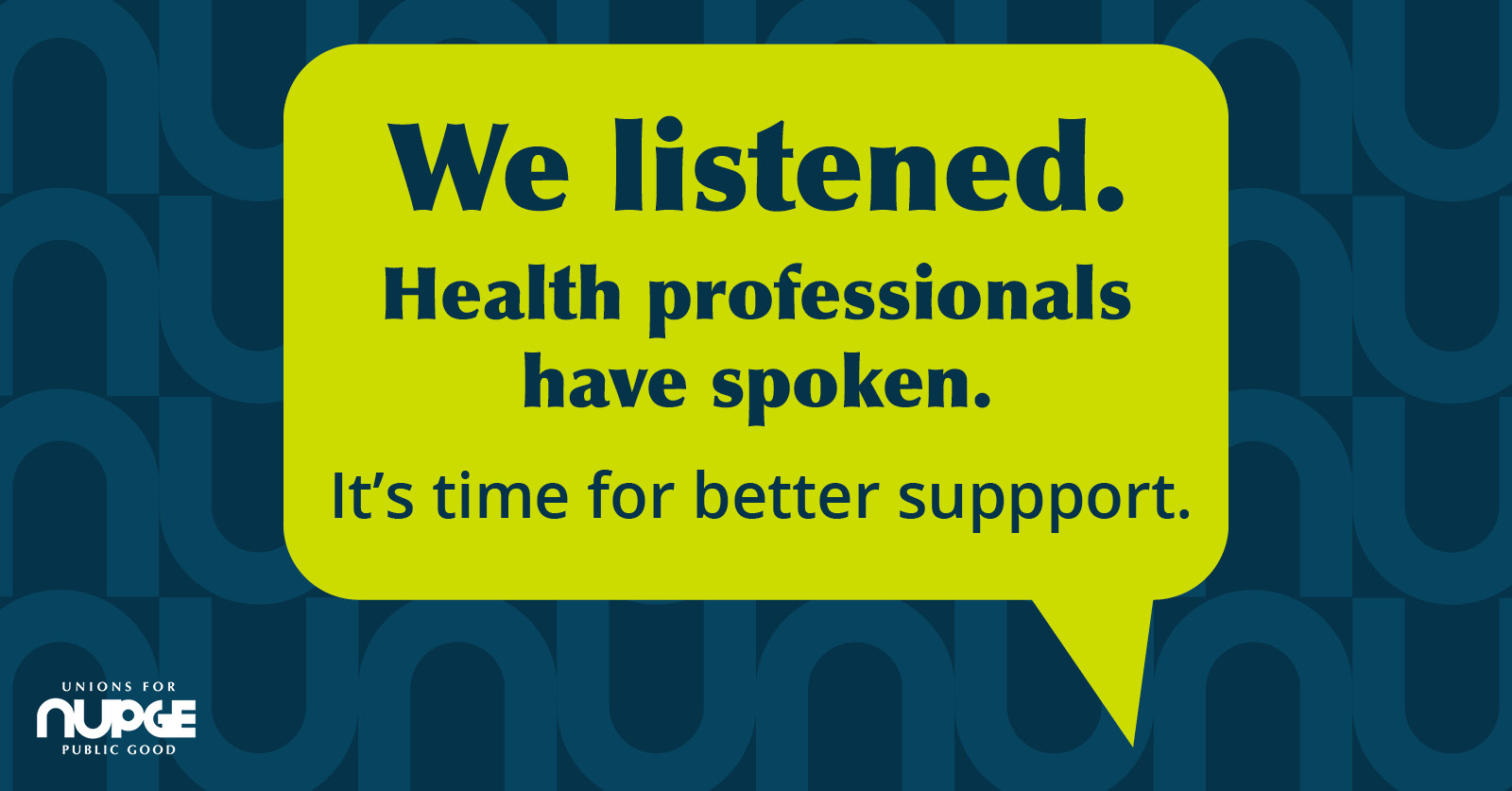February 5 2025
National Union of Public and General Employees releases new survey findings showing the strain faced by health professionals is hurting Canada’s health care system
OTTAWA, Feb. 5, 2025 – Today, the National Union of Public and General Employees (NUPGE) released the findings of a new, nationwide survey, the first of its kind, revealing that approximately 9 out of 10 health professionals in communities across the country report the system is in crisis (89%). The survey, conducted by Abacus Data, reveals more than half of workers (55%) say the system is understaffed. Four out of five workers (80%) report that working short-staffed causes moderate or severe effects on their health. And more than half (61%) report that they are experiencing heavy workloads and burnout.
These consequences are felt not only by health care workers, but by patients and their loved ones . “These are the professionals who keep the health care system running – they take your bloodwork, book your appointments, clean your hospital rooms, and do so much more to ensure patients receive quality care,” said NUPGE President Bert Blundon. “Their roles in health care are as diverse as they are critical, and all are routinely understaffed and undercompensated. This is a health human resources crisis and it calls into question the long-term viability of Canadian health care.”
In addition to chronic staffing shortages, close to three in four survey respondents are facing financial pressures (72%). Many are struggling to cover basic living expenses while others are forced to take on a second job to make ends meet. More than four in five workers (88%) feel their efforts are overlooked, despite being necessary to patient care.
Because of these conditions, health care workers are considering leaving their roles — in fact, nearly 40% of survey respondents are considering leaving health care entirely within three years.
NUPGE’s health professionals play a supportive role within health care or deliver direct care. Workers who are classified as supportive roles within healthcare include administrative, security, maintenance, cleaning, supply chain and food services. Jobs related to the direct delivery of care include diagnostic roles, paramedics, rehabilitation, therapeutic care and community care.
Nine in ten workers believe there are two key steps to resolving the crisis: increasing staffing levels and enhancing wages, benefits and pensions Almost all workers (97%) strongly support governments, unions, employers, and educational institutions collaborating to address the labour shortages.
“NUPGE is committed to fighting for better conditions for all workers. Better conditions will directly contribute to better health care for all through Canada’s public care system,” said Blundon. “These health professionals have shared experiences that show how urgent the situation is across the country. It’s time for governments to take action.”
About NUPGE
The National Union of Public and General Employees (NUPGE) is a family of 13 Component unions. Taken together, we are one of the largest unions in Canada. Most of our 425,000 members work to deliver
public services of every kind to the citizens of their home provinces. This includes a growing network of over 140 000 health care workers.
Our component unions: BCGEU, CUBEGW, HSAA, HSABC, HSAS, MAHCP, MGEU, NBU, NAPE, NSGEU, OPSEU/SEFPO, PEIUPSE, and SGEU
NUPGE Media Contact
NUPGE President Burt Blundon will be available for interviews.
Jeanne d’Arc Umurungi, Director of Communications, Political Action and Campaigns, NUPGE Cell: 613-769-3055 or 416-423-9873
Email: jumurungi@nupge.ca
The Abacus/NUPGE survey was conducted online with 6,416 members of the National Union of Public and General Employees from Nov. 22 – Dec. 16, 2024.
Quick Facts:
- Approximately 9-in-10 health professionals in communities across the country report the healthcare system is in crisis in their province (89%).
- More than half of workers (55%) say they are often or always feeling understaffed. Four-in-five workers (80%) report that working short-staffed causes moderate or severe effects on their health. And more than half (61%) report that they are experiencing heavy workloads and burnout.
- Nearly 40% of healthcare workers are considering leaving public healthcare within three years.
- Surveyed NUPGE health professional respondents believe that the most impactful actions to improve healthcare include enhancing wages, benefits, and pensions (93%) and increasing staffing levels (91%).
- Collaboration among governments, unions, employers, and educational institutions is strongly supported by almost all interviewed (97%) to address labor shortages,
- Health professionals see their roles as meaningful. The vast majority (78%) feel they are making a difference, and many feel a sense of accomplishment (64%) and importance (59%). About half feel pride (50%) or fulfillment (49%) in their work.
- A strong sense of purpose drives health professionals, with 96% finding fulfilment in their roles, 93% believing their efforts lead to positive patient outcomes, and 86% feeling part of a team and maintaining enthusiasm for their work (83%).

